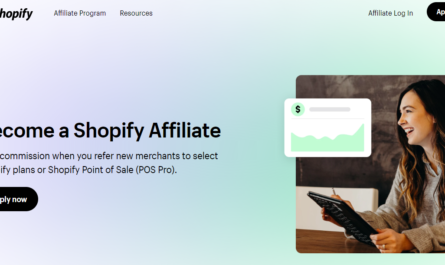Affiliate marketing is one of the most lucrative ways to earn money online, but many new marketers often believe that they need a website or blog to start. The truth is, affiliate marketing without a website is entirely possible—and it can be just as successful! Whether you’re looking to earn extra income or build a full-fledged online business, there are many ways to promote affiliate products without having to worry about maintaining a website.
In this guide, we’ll explore how to succeed in affiliate marketing without a website, share effective strategies, and provide tips on how to start earning commissions with minimal setup.
Why You Don’t Need a Website for Affiliate Marketing
It’s common to think that affiliate marketing without a website isn’t possible. After all, websites are often the central hub for content creation and product promotion. However, there are several reasons why a website isn’t necessary to start affiliate marketing:
- Direct Promotion via Social Media: Platforms like Instagram, Facebook, and TikTok are ideal for promoting affiliate products. You can build an audience, create engaging content, and share affiliate links directly without needing a website.
- YouTube for Affiliate Marketing: YouTube is a powerful platform that allows you to review products, demonstrate services, and include affiliate links in your video descriptions. Plus, videos can go viral, creating the potential for long-term passive income.
- Email Marketing: Building an email list through opt-in forms or lead magnets (like free eBooks or courses) allows you to promote affiliate products directly to your subscribers. You don’t need a website to start an email campaign.
- Affiliate Networks and Platforms: Platforms like Amazon Associates, ShareASale, or ClickBank allow marketers to share affiliate links directly on their platforms, bypassing the need for a personal website.
1. Promote Affiliate Links on Social Media
Social media is one of the most powerful tools for affiliate marketing, and it doesn’t require a website to get started. Platforms like Facebook, Instagram, Pinterest, and TikTok provide ample opportunities to promote affiliate products through posts, stories, reels, and more.
- Instagram: Use product-focused posts, stories, and Reels to share affiliate links with your followers. You can also collaborate with brands for paid promotions and affiliate partnerships.
- Facebook: Create a Facebook Page or group around a niche you’re passionate about and share affiliate content with your community. You can also join Facebook groups related to your niche and share your recommendations (just make sure to follow the group’s rules on affiliate links).
- Pinterest: Pinterest is a visual search engine where you can share affiliate links in the pin descriptions. Create eye-catching, informative pins that direct users to affiliate offers or product pages.
- TikTok: Leverage TikTok’s viral potential to create engaging videos featuring affiliate products. Include affiliate links in your bio or in the video’s description, and use popular trends to increase exposure.
Pro Tip: Always disclose your affiliate relationships to stay transparent with your audience. Use hashtags like #affiliate or #ad to maintain trust with your followers.
2. Leverage YouTube for Product Reviews and Tutorials
YouTube is a fantastic platform for affiliate marketing without a website, especially if you enjoy creating video content. You can promote affiliate products by creating reviews, tutorials, unboxing videos, or even how-to guides that feature affiliate products in use.
- Create Product Reviews: Review products related to your niche, and make sure to include affiliate links in your video descriptions. Make your reviews honest and valuable to build credibility.
- Make How-To Videos: If a product requires a tutorial, create a video demonstrating how it works. For example, if you’re promoting an online course, create a tutorial on how to use the course’s tools or features.
- Incorporate Affiliate Links in the Description: Always include your affiliate links in the video description, along with a clear call-to-action to encourage viewers to make a purchase.
Pro Tip: Optimize your videos with strong keywords in the title, description, and tags to ensure they appear in relevant search results. You can also add affiliate links directly in the pinned comment section.
3. Build an Email List to Promote Affiliate Products
You don’t need a website to start building an email list. With just a landing page (which can be created using free tools like Mailchimp or ConvertKit), you can start collecting email addresses and promoting affiliate products.
- Offer Lead Magnets: Create valuable resources such as eBooks, guides, checklists, or free courses to entice people to subscribe to your list.
- Use Email Sequences: Once someone subscribes, set up an automated email sequence that promotes affiliate products in a natural, non-pushy way. Share insights, tips, or resources and then recommend products that fit the content of your emails.
- Segment Your List: By segmenting your email list based on user interests, you can promote targeted affiliate products, increasing the likelihood of conversions.
Pro Tip: Keep your emails valuable, informative, and transparent. Always disclose affiliate links to maintain trust with your subscribers.
4. Share Affiliate Links on Quora and Reddit
Quora and Reddit are Q&A platforms where people go to ask questions and seek advice. These platforms are excellent for affiliate marketing without a website, as they allow you to answer questions and share affiliate links.
- Quora: Look for questions related to your niche and provide detailed, helpful answers. Make sure to include affiliate links where relevant. For example, if someone asks for recommendations on the best cameras for vlogging, you can share a product review or link to your affiliate offer.
- Reddit: Join subreddits related to your niche, contribute valuable insights, and share affiliate links when appropriate. Make sure to follow each subreddit’s rules, as some don’t allow direct promotions.
Pro Tip: Build a reputation as a helpful, knowledgeable contributor before sharing affiliate links. Over-promotion can get you banned from some communities.
5. Use Affiliate Marketing Platforms and Networks
Many affiliate marketing platforms allow you to promote affiliate links directly on their websites, bypassing the need for a personal website. Platforms like ClickBank, ShareASale, Amazon Associates, and Rakuten offer a wide variety of products you can promote and earn commissions from.
- ClickBank: ClickBank allows you to promote digital products in various niches. Once you join, you can directly share affiliate links without the need for a website.
- Amazon Associates: You can promote Amazon products without a website by sharing affiliate links on social media, YouTube, or email.
Pro Tip: Use these platforms to find high-converting products and relevant affiliate programs. Many also offer marketing materials, such as banners and pre-made content, to make the promotion process easier.
6. Engage in Affiliate Marketing Through Podcasts
Podcasting is a growing industry with increasing opportunities for affiliate marketing without a website. By starting your own podcast or appearing as a guest on established shows, you can promote affiliate products in a natural, conversational way.
- Start Your Own Podcast: Share your experiences, insights, or interviews, and use affiliate links in your show notes. Many podcasts also offer sponsorships, which is another way to earn affiliate commissions.
- Guest Appearances: Collaborate with other podcasters by offering value to their audience and sharing affiliate links.
Pro Tip: Mention your affiliate offers during the podcast and direct listeners to your show notes for more information.
Final Thoughts
As you can see, affiliate marketing without a website is entirely feasible. By leveraging platforms like social media, YouTube, email marketing, and affiliate networks, you can start promoting affiliate products and earning commissions without the hassle of creating and maintaining a website.
Whether you’re just starting out or looking for additional income streams, these strategies provide flexible and low-cost alternatives to a website-based affiliate marketing business. With persistence, creativity, and the right tools, you can succeed in affiliate marketing without a website and begin earning commissions in no time.




